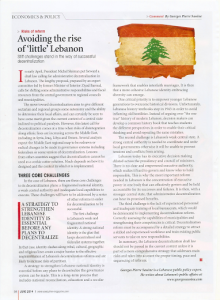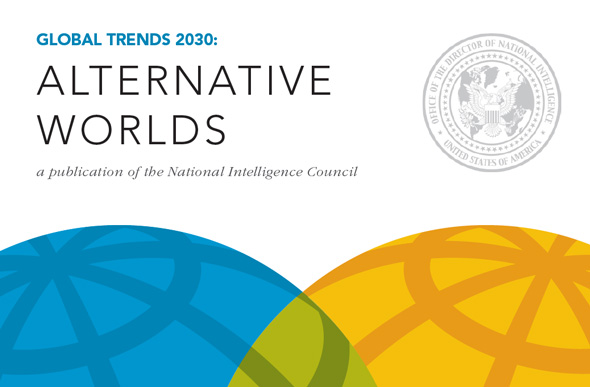Stiff challenges stand in the way of successful decentralization
By Georges Pierre Sassine on May 19, 2014.
A version of this article appeared on May 19, 2014 in the online edition and in the June 2014 print edition of Executive Magazine.
In e arly April, President Michel Sleiman put forward a draft law calling for administrative decentralization in Lebanon. The lengthy proposal, prepared by an expert committee led by former Minister of Interior Ziyad Baroud, calls for shifting some administrative responsibilities and fiscal resources from the central government to regional councils and municipalities.
arly April, President Michel Sleiman put forward a draft law calling for administrative decentralization in Lebanon. The lengthy proposal, prepared by an expert committee led by former Minister of Interior Ziyad Baroud, calls for shifting some administrative responsibilities and fiscal resources from the central government to regional councils and municipalities.
The move towards decentralization aims to give different sectarian and regional groups some autonomy and the ability to determine their local affairs, and can certainly be seen to have some merit given the current context of a central state inclined to political paralysis.
However, this latest call for decentralization comes at a time when risks of disintegration along ethnic lines are increasing across the Middle East, including Syria, Iraq, Libya and Yemen. Several analysts expect the Middle East regional map to be redrawn or radical changes in governance systems including federalism or some version of decentralization.
Lessons from other countries suggest that decentralization cannot be used as a cookie cutter solution across countries and instead much depends on how it is designed and the context it is implemented in.
Three core challenges
In the case of Lebanon, there are three core challenges to its decentralization plans: a fragmented national identity, a weak central authority and inadequate local capabilities to execute. These challenges will have to be addressed by a series of other reforms in order for decentralization to be successful.
The Lebanese decentralization draft law should be part of a more comprehensive strategy that addresses main risks and takes into account the proper timing, pace and sequencing of reforms. Georges Sassine
The first challenge is Lebanon’s weak and fragmented national identity. The hypothesis is that a strong national identity is the glue that keeps decentralized and federalist systems together. In that case, identity clashes along tribal, cultural, geographic and religious lines make a major barrier to the effective implementation of Lebanon’s decentralization reforms and are likely to increase risks of partition.
A strategy to strengthen Lebanese national identity is essential before any plans to decentralize the governance system. This is a long-term process that includes national reconciliation, education and a secular framework that enables interfaith marriages. It is then that a more cohesive Lebanese identity embracing diversity can emerge.
One critical priority is to empower younger Lebanese generations to overcome historical divisions. Unfortunately, Lebanese history textbooks stop in 1943 in order to avoid inflaming old hostilities. Instead of arguing over ‘the one true’ history of modern Lebanon, decision makers can develop a common history book that teaches students the different perspectives in order to enable their critical thinking and avoid repeating the same mistakes.
The second challenge is Lebanon’s weak central state. The hypothesis is that a strong central authority is needed to coordinate and unite local governments otherwise it will be unable to prevent tensions and conflict from arising.
Lebanon today has its executive decision making diluted across the presidency and council of ministers. There is no clear and empowered executive authority, which makes it hard to govern and know who to hold responsible. This is why the most important reform needed in Lebanon is to concentrate executive power in one body that can effectively govern and be held accountable for its successes and failures. It is then, with a stronger central state, that administrative decentralization can bear its promised benefits in Lebanon.
The third challenge is the lack of experienced personnel and inadequate training of local bureaucrats, which would be detrimental to implementing decentralization reform.
Correctly assessing the capabilities of Lebanese municipalities and having a plan to strengthen their competencies is critical. Lebanon’s decentralization reform has to be accompanied by a detailed strategy to attract a skilled and experienced workforce, and train existing public servants to take on their new responsibilities.
In summary, the Lebanese decentralization draft law should not be passed in the current context unless it is part of a more comprehensive strategy that addresses main risks and takes into account the proper timing, pace and sequencing of reforms.
Georges Pierre Sassine is a Lebanese public policy expert. He writes about Lebanon’s public affairs at www.georgessassine.com

